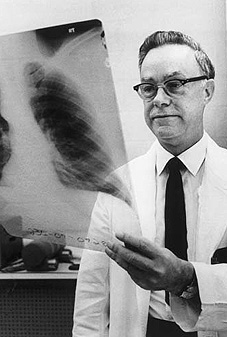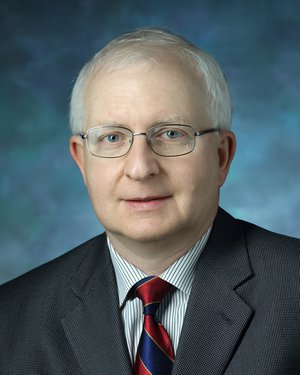 RUSSELL H. MORGAN made significant contributions to radiology by inventing an exposure meter that shut off X-ray equipment the moment film had been properly exposed, reducing unnecessary exposure to radiation. His innovations also improved the precision of X-ray pictures. Dr. Morgan chaired the Department of Radiology and Radiological Science for 25 years, also heading the Division of Radiation Health Sciences in the School of Public Health for a decade. In 1971, he was named dean of the School of Medicine and, two years later, vice president for medicine at Hopkins. Dr. Morgan’s many honors include the 1979 German Roentgen Medal, one of the highest honors in his field. He was the first president of the Association of University Radiologists, a consultant to the surgeon general, and chairman of the National Academy of Sciences Committee on Health Research Programs of the Department of Energy.
RUSSELL H. MORGAN made significant contributions to radiology by inventing an exposure meter that shut off X-ray equipment the moment film had been properly exposed, reducing unnecessary exposure to radiation. His innovations also improved the precision of X-ray pictures. Dr. Morgan chaired the Department of Radiology and Radiological Science for 25 years, also heading the Division of Radiation Health Sciences in the School of Public Health for a decade. In 1971, he was named dean of the School of Medicine and, two years later, vice president for medicine at Hopkins. Dr. Morgan’s many honors include the 1979 German Roentgen Medal, one of the highest honors in his field. He was the first president of the Association of University Radiologists, a consultant to the surgeon general, and chairman of the National Academy of Sciences Committee on Health Research Programs of the Department of Energy.
Russell H. Morgan Professorship in Radiology
School of Medicine
Radiology
Established in 1994 by friends and colleagues of Russell H. Morgan in his honor
Held by Andrew G. Horti
 ANDREW G. HORTI, PH.D., M.S. is the second recipient of The Russell H. Morgan Professorship in the Russell H. Morgan Department of Radiology and Radiological Science. He serves as a Professor in the Division of Nuclear Medicine and Molecular Imaging.
ANDREW G. HORTI, PH.D., M.S. is the second recipient of The Russell H. Morgan Professorship in the Russell H. Morgan Department of Radiology and Radiological Science. He serves as a Professor in the Division of Nuclear Medicine and Molecular Imaging.
Dr. Horti earned his undergraduate degree in physical chemistry and his doctorate in organic chemistry at the Leningrad Institute of Technology in the USSR. In 1992, he joined Johns Hopkins as a post-doctoral fellow in positron emission tomography (PET) radiochemistry, followed by an additional post-doc fellowship at the Yale University School of Medicine. He returned to Baltimore to serve as chief radiochemist at the National Institute on Drug Abuse’s PET facility. He joined the Johns Hopkins Radiology faculty as an assistant professor in 2004, subsequently rising through the ranks to professor.
His work in developing several high-affinity PET imaging agents places Dr. Horti at the forefront in the field of radiopharmaceuticals. Several of his radiotracers have been used in human-subject clinical trials, and he has developed PET tracers for imaging notoriously difficult nicotinic receptor subtypes to enable PET groups worldwide to study their functions for the first time. Most recently, Dr. Horti developed the first clinical radiotracer for imaging a receptor involved in neuroinflammatory disorders.
Beyond his direct research work, Dr. Horti is an exceptional mentor to postdoctoral fellows, and an active member of the NIH. He has fostered national and international collaborations through his valuable PET imaging compounds and the data they have enabled.